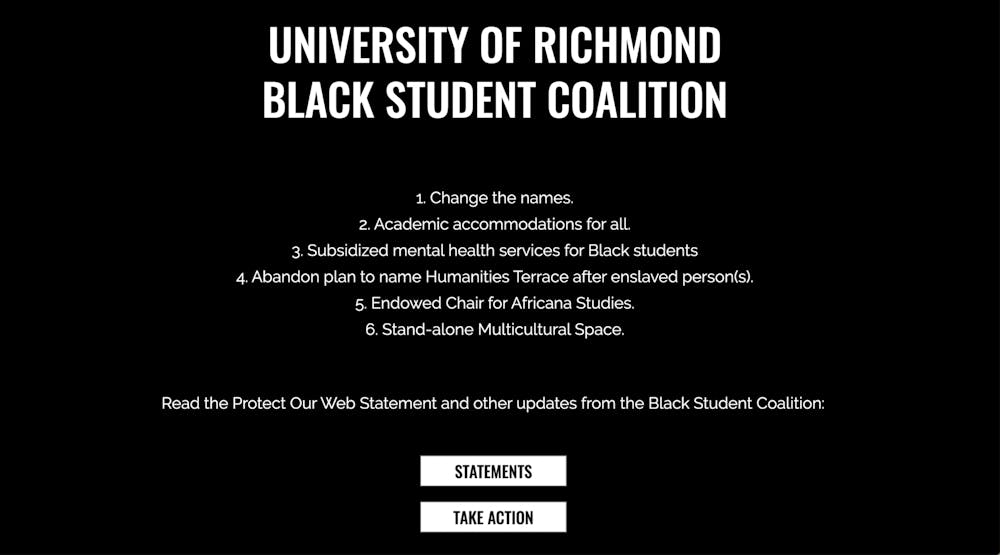Editor's Note: Shira Greer is a Collegian editor.
The Black Student Coalition held its second teach-in on April 2 to announce an addendum to the Protect Our Web compact and to present on power and institutional hierarchy.
The presenters consisted of seniors Jesse Amankwaah and Kayla Corbin, juniors Shira Greer and Jordyn Lofton, sophomore Simone Reid and first-year Katiana Isaac.
Corbin said Paul Queally, rector of the Board of Trustees, repeatedly asked BSC members at a March 26 meeting with students what the fourth, fifth and sixth demands would be.
“Therefore, the Black Student Coalition is issuing demands four, five and six as requested by the rector of the Board of Trustees,” Corbin said.
The teach-in began with a message stating that the BSC must stand united and be empowered by Black history.
“We know that the actions and inaction of this university are direct results of white supremacy,” Amankwaah said.
Amankwaah said the Board had abused its power by dismissing the concerns of Black students, which was demonstrated in its March 17 statement that said the names of Ryland and Mitchell-Freeman halls would not be changed to remove the names of Robert Ryland and Douglas Southall Freeman.
Greer presented on the institutional hierarchy at UR and said that the members of the Board are the people at UR with the most power. This flow of power did not always exist, as the Board's purpose was meant to make the president of UR's life easier, Greer said.
Corbin reiterated the first, second and third demands of the Protect Our Web compact during the teach-in; the first is to change the names of Ryland and Mitchell-Freeman halls, the second is to increase academic accommodations in light of the COVID-19 pandemic and the third is to subsidize off-campus mental health services for Black students.
Corbin restated that the BSC would not back down from the original demands, and the additional demands were a result of the requests from Queally for additional demands at the March 26 meeting.
Lofton introduced the fourth, fifth and sixth demands.
Enjoy what you're reading?
Signup for our newsletter
The demands include the Board abandoning the plans to name the new Humanities Commons after an enslaved person or persons, the creation of an endowed chair for the Africana studies program and to begin hiring for the position in the fall of 2021, and for the Board to release a plan to expand the Multicultural Student Space to its own building on campus, Lofton said.
After the demands were announced, Reid repeated that the addition of three new demands was not the BSC giving up on the original demands, but rather it was them pushing for more equal treatment of Black students.
“The goal has always been to improve the well-being of Black students at UR," Reid said. "So we’re changing our game plan to gain the most possible advantages for Black students."
The teach-in lasted around 20 minutes and was uploaded to the Protect Our Web Instagram page for viewing.
Contact news co-editor Westen Doran at westen.doran@richmond.edu.
Support independent student media
You can make a tax-deductible donation by clicking the button below, which takes you to our secure PayPal account. The page is set up to receive contributions in whatever amount you designate. We look forward to using the money we raise to further our mission of providing honest and accurate information to students, faculty, staff, alumni and others in the general public.
Donate Now



